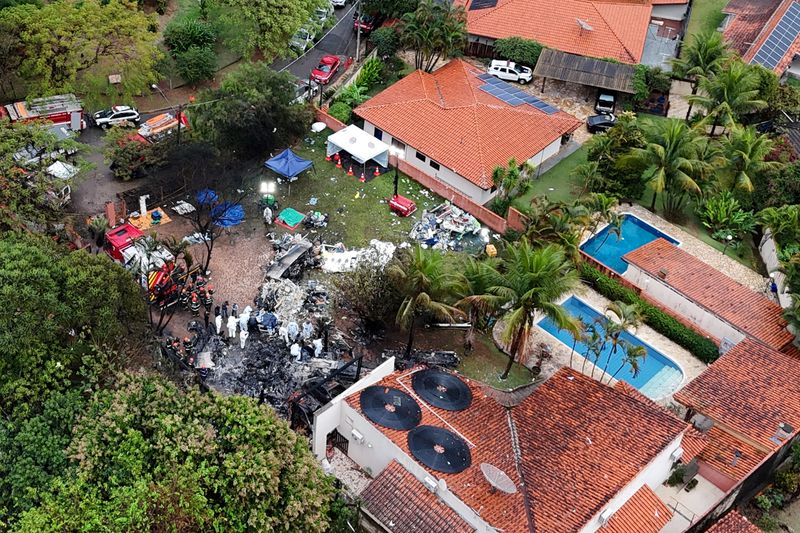Early report to show history of Brazil Voepass ATR flight that crashed in August

By Luciana Magalhaes, Allison Lampert and Gabriel Araujo
SAO PAULO (Reuters) – Fresh details about the last moments of a plane operated by Brazilian regional carrier Voepass could be unveiled in a preliminary report set for release on Friday, as investigators weigh possible contributing factors like icing and maintenance.
The report by Brazil’s Center for Research and Prevention of Aeronautical Accidents (CENIPA) should give a history of the Aug. 9 ATR 72-500 flight that killed 62 when it crashed in Vinhedo, some 80 km (50 miles) northwest of Sao Paulo, industry experts said.
A final report by the Brazil-led investigation on the causes of the tragedy could come a year after the doomed flight bound for Sao Paulo’s Guarulhos international airport crashed.
Air crashes usually occur due to multiple factors.
Some experts have cited ice on the wings as a possible contributor to the crash, because warning notices were issued that day for severe icing in the region. An equipment review of the plane on Aug. 8 seen by Reuters didn’t flag any problems related to the de-icing devices.
Aviation Herald, a safety publication, reported that the turboprop airplane, which uses turbine engines to turn propellers that move the aircraft, had re-entered service only a month before the crash after being damaged in a tail strike in March.
The ATR-72 has been involved in several cases where pilots lost control after ice build up, including one where a plane stalled in 2016 in Norway, but the pilot regained control. In 2010, icing and pilot error were blamed for an Aero Caribbean Flight 883 crash in Cuba, killing 68 people.
The plane’s flight data recorder (FDR) should indicate whether the aircraft’s de-icing system was activated, said Greg Feith, a former U.S. National Transportation Safety Board investigator who probed the 1994 crash of an ATR-72 in Indiana.
The FDR could also indicate the presence of alerts related to ice formation and stall speed, added Eder Luiz Oliveira, who teaches airplane maintenance at Unesp University, in the state of São Paulo.
INVESTIGATING CANCELLATIONS
According to data from FlightAware, only two of the 190 ATR 72 flights operated in Brazil on Aug. 9 were canceled, both by Voepass, the country’s fourth-largest airline by market share. At least 13 different ATR aircraft took off or landed in the region of the accident.
Despite the icing warning, one ATR pilot at Brazilian carrier Azul said aviators were not told to avoid the area on Aug. 9, but they took precautions.
ATR aircraft usually have inflatable rubber “boots” installed on the wings to help remove accumulated ice.
Weather conditions and icing are also expected to be discussed at a congressional committee’s hearing into the crash, with invitees including top airline executives, investigators and representatives for planemaker ATR, a joint venture between Europe’s Airbus and Italy’s Leonardo.
“Our initial investigation shows that ice has been a problem for this aircraft, so we want to know how many planes flew over the area and at what time,” said Congressman Nelsinho Padovani, a leading member of the committee.
Voepass said in a statement that all systems in the ATR 72-500 aircraft were fully operational and that the company follows all regulations.
CENIPA would not comment ahead of Friday.
The crash captured global attention after images of the plane’s last moments in a so-called flat spin circulated on social media.
Three police officers who worked on identifying the flight´s victims said the crash site provided clues into the last moments of the flight: passengers hunched over their legs, as though bracing for an emergency, while a mother embraced her son.
The stalled plane fell without any forward movement, barely damaging one home in the housing complex where it landed, Mauricio Freire, the chief of Sao Paulo’s Identification Bureau told Reuters.
“It was the first time I saw a plane hit the ground like that, it didn’t slide at all,” Freire said.
(Reporting by Luciana Magalhaes and Gabriel Araujo in Sao Paulo and Allison Lampert in Montreal; Editing by Christian Plumb and Aurora Ellis)









